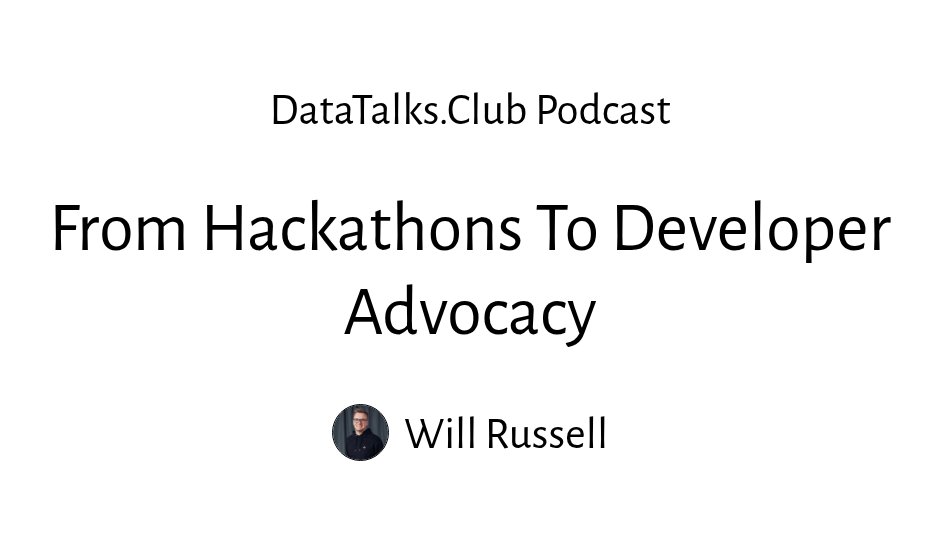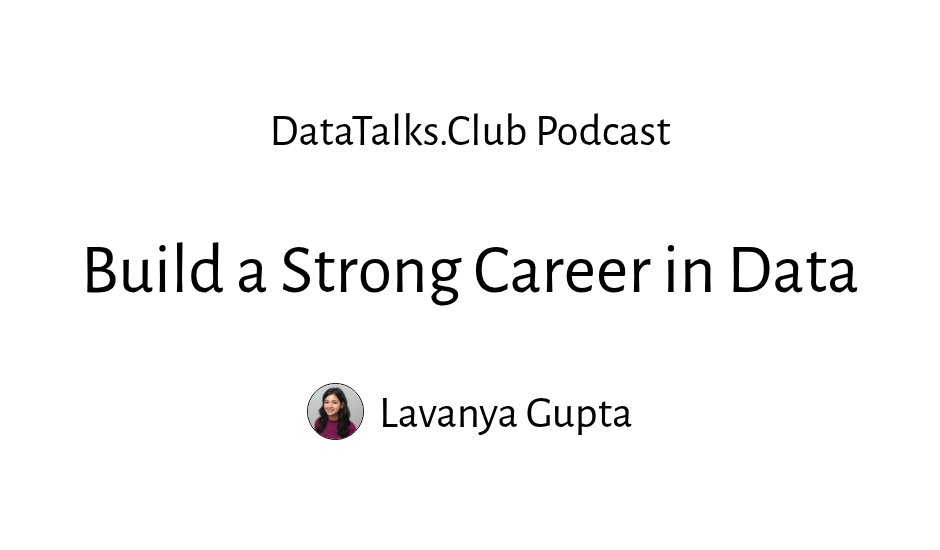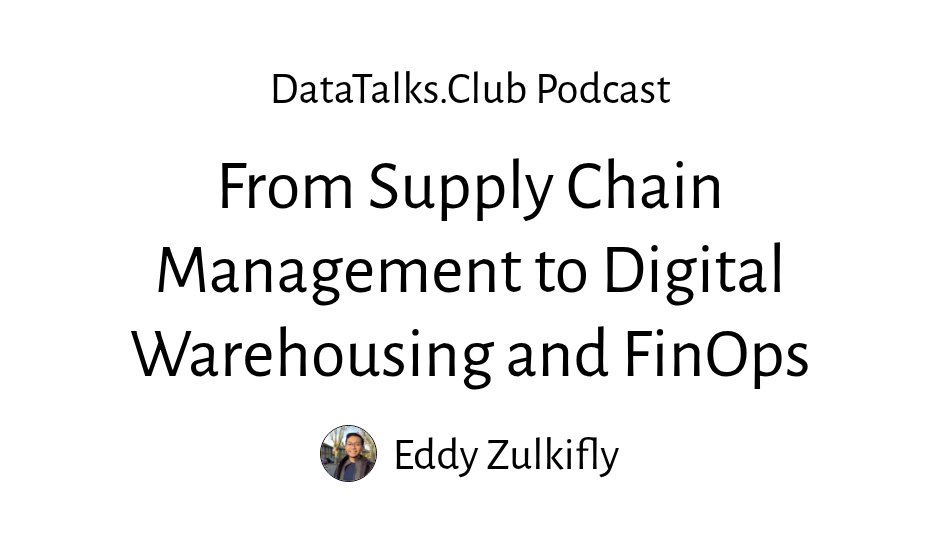Data Freelancer Playbook: Land Clients, Price Services & Use AI for Productivity | Dimitri Visnadi
Listen to or watch on your favorite platform
Show Notes
How do you move from employed data pro to a sustainable data freelancer who consistently lands clients, prices services well, and uses AI to boost productivity? In this episode, Dimitri Visnadi — an independent data consultant focused on data strategy who’s worked with Unilever, Ferrero, Heineken and Red Bull, held roles at HP and a Google-partnered firm, and holds a Masters in Business Analytics & Computer Science from UCL — walks through a practical playbook for data freelancers.
Dimitri covers job-tenure trends and freelancer types, when to sell expertise versus problem-solving, and how to validate freelance viability with financial targets. He explains how to land initial clients through recruiters and LinkedIn, the idea behind a data-freelancer job board, market-driven specialization, and insights on rates, top skills and data management. You’ll hear about scaling choices (lifestyle business vs agency), AI tools for productivity (Claude, ChatGPT, Cursor), course and community approaches for branding and marketing, subscription models and client relationship management, high-impact small analyses, pricing strategies (hourly vs packages), and transition planning.
Listen to get concrete guidance on landing clients, setting prices, structuring offers, and using AI tools to increase productivity as a freelance data consultant.
Links:
About the Guests

Dimitri Visnadi
Dimitri Visnadi is an independent data consultant with a focus on data strategy. He has been consulting companies leading the marketing data space such as Unilever, Ferrero, Heineken, and Red Bull.
He has lived and worked in 6 countries across Europe in both corporate and startup organizations. He was part of data departments at Hewlett-Packard (HP) and a Google partnered consulting firm where he was working on data products and strategy.
Having received a Masters in Business Analytics with Computer Science from University College London and a Bachelor in Business Administration from John Cabot University, Dimitri still has close ties to academia and holds a mentor position in entrepreneurship at both institutions.
Timestamps
Transcript
The transcripts are edited for clarity, sometimes with AI. If you notice any incorrect information, let us know.
Episode Opening & Dimitri’s Data Journey
Episode Opening & Dimitri’s Data Journey
Alexey: Hi everyone, welcome to our event. This event is brought to you by DataTalks.Club, a community of people who love data. We have weekly events. If you want to find out more, there is a link in the description. (0.0)
Dimitri: I think it’s linked in your document. (1:27)
Alexey: Yes, it is. I think it streamed about a year ago, November 20th, 2023, so slightly more. (1:34)
Dimitri: Hi everyone. I started in 2013 after graduating in business administration. I fell in love with data after my first internship. I loved Excel and that was my entry into the data world. (3:36)
Job Tenure Trends & Freelancer Types
Job Tenure Trends & Freelancer Types
Alexey: I want to apologize for going off script, but isn’t it fun? You mentioned staying one and a half years on average at companies. I had a similar situation until I found a company where I stayed much longer. Do you think staying around a year to a year and a half is becoming the new norm? (5:41)
Dimitri: It depends. Some say you need about six to seven months to really start providing value because you have to learn the people, the product, and the tools. It takes time to become a valuable employee. (6:21)
Alexey: To be frank, switching jobs frequently is one of the best ways to increase your salary. (7:10)
Dimitri: Yes, probably. When I switched jobs often, I thought employers might ask how long I'd stay with them, which I found embarrassing. I also think this has to do with generational mindset shifts. (7:16)
Alexey: You mentioned it takes time to become a valuable employee by learning ropes, people, and custom tech. As a freelancer, don’t you also need time to learn these before doing your job well? Or does the client prepare everything so you can just focus on your work? (8:38)
Dimitri: Yes and no. There are different types of freelancers: those who sell skills and those who sell expertise. (9:22)
Expertise vs Problem-Solving in Freelance Work
Expertise vs Problem-Solving in Freelance Work
Alexey: If you don’t know how to solve a specific problem, can you "fake it till you make it," like start solving and researching as you go? Does this apply in freelancing too, or is problem-solving itself the expertise you sell? (10:50)
Dimitri: You can have projects where you need to figure things out as you go, both as an employee and freelancer. It depends on the task to be delivered. (11:22)
Alexey: I’ve been doing some freelancing/contract projects, helping companies create courses. My expertise is creating courses, but I don’t always know the specific content or technologies to use, so I have to learn them. That’s also fine. (12:04)
Dimitri: That’s a good example. Your expertise is how to create courses: defining the audience, the transformation you want, the technology used to host the course, budgets, and recording setups. You just fill in the content based on the client’s information. (12:38)
Alexey: You said freelancing worked well for you. How did you know it was working and you were happier? (13:59)
Validating Freelance Viability: Financial Targets
Validating Freelance Viability: Financial Targets
Dimitri: The most important part is making money. When I started, I had no clients but set an 8-month deadline to get enough clients or money to show it was viable. If it didn’t work, I had four months to find a job. (14:13)
Landing Initial Clients: Recruiters & LinkedIn
Landing Initial Clients: Recruiters & LinkedIn
Alexey: How exactly did you get your first client? Did recruiters help you find clients? Was it easy? (16:08)
Dimitri: Before freelancing, recruiters sometimes contacted me on LinkedIn offering freelance projects. That made me realize freelancing was possible. (16:27)
Market Trends & Building a Data-Freelancer Job Board
Market Trends & Building a Data-Freelancer Job Board
Alexey: You’ve been in the industry for a while and seen trends change. A few years ago, MLOps was popular, but now it seems less so. The problems remain, but AI and new terms are more popular. What is hot in the market now for freelancing? (17:33)
Dimitri: It’s tough to say because I mainly feed my own pipeline and am not a market research expert. Hot topics are in the news and companies look for those skills to some extent. (18:20)
These umbrella terms are understood by most companies they know a data analyst gets insights from data and a data engineer handles infrastructure so these roles continue to be in demand.: Alexey (20:32)
These umbrella terms are understood by most companies they know a data analyst gets insights from data and a data engineer handles infrastructure so these roles continue to be in demand.: Do you see many ML engineer roles right now? (20:32)
Dimitri: I see ML engineer roles sometimes, but I haven't looked into it that closely, to be honest. (20:39)
Alexey: So, what is this job board? Is it something you're maintaining? (20:46)
Dimitri: Yes. For context, a couple of years ago, during my paternity leave, I started sharing my journey as a data freelancer and learning how other freelancers find jobs. One thing I noticed is most visible projects are posted by recruiting agencies on their individual job boards, on sites like LinkedIn, Upwork, and so forth. (20:55)
Dimitri: I decided to crawl these websites and aggregate them all into a single data freelancer job board. This helps me and others stay on top of the newest projects. Crawling this information also provides details like average project budgets, so you can get interesting statistics. (20:55)
Dimitri: I also follow big organizations, like Freelancer Map, that let agencies post projects and publish market research studies on freelancing trends. It's always interesting when trends they discuss match what I see on my job board. It's growing bigger over time. (20:55)
Alexey: Your job board is specifically about data freelancers, right? You don't include DevOps, front-end, or back-end roles? (22:45)
Dimitri: Correct. I segment the listings mainly by job title. Sometimes filters need updating because I crawl much more than just data roles, and occasionally, non-data roles like designers appear by mistake, but that's rare. If a new role like LLM engineer becomes popular, I add it to the filter so it appears. (22:52)
Dimitri: I try to really focus and segment jobs for data analysts, data engineers, data architects, AI specialists, web analysts, and similar roles. (22:52)
Market-Driven Specialization & Starting Paths
Market-Driven Specialization & Starting Paths
Alexey: Do you think it could be more valuable to start freelancing as a generic software engineer, not focusing on data and then transition? Or, since freelancing usually means specializing and selling your expertise, is it better to learn data engineering first before freelancing? (23:51)
Dimitri: It's hard to say what's the best route. I always suggest looking at the market first and working backwards from there. (24:22)
Alexey: I thought of this because you mentioned throwing out a lot of non-data postings when crawling. If there are so many backend and general software roles, maybe it makes sense for someone to start freelancing there. What do you think? (24:29)
Job Board Insights: Rates, Top Skills & "Data Management"
Job Board Insights: Rates, Top Skills & "Data Management"
Dimitri: It really depends on the skills you have. If you're a data analyst, you likely won't become a software engineer overnight—it takes time to learn new skills. I could pull up numbers on how many software engineering roles get filtered out, but not immediately. (25:08)
Dimitri: If you visit the website, there's a "Freelancer Rates" section that shows hourly rates by job title and top skills. It gives a sense of distribution and most frequent and top-paying skills. Some high-paying skills have lower counts because they appear less but have higher rates. (25:08)
Dimitri: The job board is a side project to serve my own needs, as I can't personally take on 99% of the projects there. But adding a new source is fast with my system. Building the crawler taught me about data engineering, even though my background is in business and Excel, and I'm not a great coder. It's also been a learning project for me. (25:08)
Alexey: I see you have a section of top-paying skills. The first is "data management" ($120/hour), then "AI development" ($116/hour). What is data management? (27:52)
Dimitri: That's a good question. I need to define it better on the site. Usually, data management jobs have the words "data" and "management" in the title. (28:14)
Alexey: Is that like organizing data storage, deciding whether to use S3, MySQL, Hadoop, and so on? (28:29)
Dimitri: It could be. I need to improve filtering for sure, but often, if a project can't be categorized as data analyst or engineer, I check for words like "manager" or "lead." Some data management jobs are technical, like database managers, while others are more strategic, like data strategy projects or fractional data leads. Those get grouped under data manager and can involve team leadership. (28:40)
Alexey: Now it makes sense why the top-paying skill management roles often command higher rates. (29:42)
Dimitri: Exactly. Top paying skills typically have the lowest counts since there might only be a few high-paying projects pulling up the average. It's not a perfect visualization yet, but I wanted to publish what I have rather than wait for perfection. People with experience can see the trends and truth in the data, and often suggest additional improvements for the visualizations. I add those as I receive feedback. The goal is to make it available to everyone. (29:48)
Alexey: I'm checking your job board now. Do you plan to publish historical data as open source, so people can analyze trends? (30:53)
Dimitri: No one's asked until now, but maybe I should. (31:13)
Alexey: That could be really valuable for people and course participants looking for interesting datasets. With enough data, it would be easier to answer questions on what's trending. (31:19)
Dimitri: That sounds like a good idea. Freelance job postings become irrelevant quickly, since they're only valid for a couple of weeks. That's why my board only shows projects from the last month. I started collecting this in March last year, so I'm getting to a full year of data. I’ll think about how to share it and get back to you for ideas on structuring and publishing. (31:52)
Lifestyle Business vs Agency: Scaling Choices
Lifestyle Business vs Agency: Scaling Choices
Alexey: I’d be happy to help, since we’ve published datasets on Kaggle before. But the main topic is freelancing, not datasets. Suppose I found a few clients after a couple of months—what’s next? Do I just continue freelancing, or is there a way to start a freelancing business or agency? Or is it fine to keep enjoying the lifestyle? (32:48)
Dimitri: It depends on the person and their aspirations. If you start freelancing and find initial success, supporting your lifestyle, that's great. For me, I call it a lifestyle business. If you reach the level where you're not worried about getting your next client, that's when you consider scaling into a business. (33:53)
Dimitri: I tried this in my second year, becoming a small agency—getting more clients and outsourcing work to other freelancers. I subcontracted four freelancers for one project, and nine for another. But managing teams, following up, and handling maintenance were pain points for me, so I decided not to pursue the agency model. Some people thrive in that setup and grow successful agencies, but it wasn't for me. (33:53)
Dimitri: Nowadays, I prefer being a one-person team. I’ll collaborate for the right opportunity, but mainly work with a handful of good clients. You don't need 100 clients; a few good ones are enough to sustain you. Getting new clients is always a challenge, even after many years, but over time, existing clients refer you and offer more projects. The goal is to continue doing interesting work with the clients you have. (33:53)
AI Tools for Productivity: Claude, ChatGPT, Cursor
AI Tools for Productivity: Claude, ChatGPT, Cursor
Alexey: I noticed my productivity surged after incorporating AI tools into my workflow. Besides Claude, do you use any other AI tools? (38:01)
Dimitri: So far, mostly Claude. When I started using it, I found the 3.1 model was amazing for coding. Of course, ChatGPT came out with image features and I use it occasionally—sometimes subscribing, sometimes cancelling. I use it for generating images or for tasks related to Data Freelancer, like translating job descriptions or extracting skill lists from projects in other languages. ChatGPT was there from the start, so I'm very familiar with it, especially through the API. (38:21)
Alexey: Do you use tools like Cursor or Lablable? (39:26)
Dimitri: Not yet. There are so many new tools, sometimes I wonder if I should spend more time exploring, but I haven't so far. (39:32)
Alexey: I recently switched from Claude to Cursor, since it embeds chat directly into Visual Studio Code and it's convenient for coding. (39:42)
Dimitri: That makes a lot of sense, especially if you code a lot (40:12)
Alexey: I wish I coded more because I do a lot of operational work these days. Another thing: you mentioned freelancing as a lifestyle business. What exactly do you mean by that? (40:17)
Dimitri: For me, a lifestyle business means living my life on my terms. I don't have to answer to anyone, only myself. I decide where and when I want to work, whether that's on my couch or in bed. (40:35)
Dimitri: Nowadays, working from home is more accepted, especially since the COVID pandemic. But being a freelancer isn't just about working from home. For example, I used to change companies and countries, and when I asked to keep working from another country as an employee, employers would often say it's a legal issue. As a freelancer, I can move countries and keep working with the same clients, no problem. (40:35)
Dimitri: Being an employee means working on assigned tasks, but freelancing comes with an entrepreneurial aspect. You become your own business, experiment more, and create new possibilities to earn money or fulfill personal interests. For example, I built my job board and started my online course for data professionals interested in freelancing. (40:35)
Dimitri: I chose to build these things myself including coding in JavaScript, which I had to learn, often with the help of AI tools. When someone pays for my course, even if it's a small amount, it brings satisfaction. It’s different from an hourly freelance project: you make money while you sleep and develop new skills and passions, like marketing or web scraping. You’re free to try new things. If something doesn’t work, that’s fine. For me, that freedom to experiment and control my time is what makes it a lifestyle business. (40:35)
Alexey: That makes sense you’re your own boss. You can decide to spend a day experimenting, others working with clients, and another looking for new projects. Even if a day doesn't bring in money, at least it's your choice. No one can tell you not to do it. (44:49)
Course & Community: Branding, Marketing, and Support
Course & Community: Branding, Marketing, and Support
Dimitri: Exactly. I also have an online course, Data Freelancer, for data professionals who have been employees but want to explore freelancing. Many don't know what to consider before making the move, how to attract clients, or what strategies to use. The course serves both people considering freelancing and those just starting out, with a foundation of knowledge, a downloadable PDF, and access to a small community of like-minded freelancers. (45:30)
Dimitri: Apart from the course, twice a month I organize community events often with guests teaching branding, outreach, or marketing for freelancers, instead of technical skills, because that's what we need to improve. (45:30)
Alexey: Those are skills you rarely develop as a full-time employee, like marketing yourself. (47:25)
Dimitri: Exactly, and it's a valuable exchange. The course gives a foundation, but the community and live events help freelancers support each other by sharing experiences and actions. (47:37)
Alexey: And all this is on datafreelancer.com, including your job board and freelancer rates, right? (48:14)
Dimitri: Correct. (48:21)
Subscription Model & Client Relationship Management
Subscription Model & Client Relationship Management
Alexey: That leads into diversifying the business. Your main focus is on client projects, but you also set aside time for other ideas like the course. Do you do anything else? (48:33)
Dimitri: Diversifying is important. Besides promoting the online course, I've focused on improving my lifestyle business. I used to do mostly hourly pricing, but after becoming a father in 2023, I wanted more stability and time with family. (48:51)
Dimitri: So I've introduced a subscription model. Clients pay a subscription fee for ongoing access to my skills as their data analytics command center. We do 6- or 12-month contracts. Clients can ask me anything, and I join their team meetings. This creates more predictable and stable income. (48:51)
Dimitri: My clients are usually small, founder-led e-commerce businesses. They aren't data experts, so they don’t overload me with tasks. We build trust, I push them towards the right actions, and if they don’t implement changes quickly, I get downtime to work with other clients. It works well for this type of business. (48:51)
Alexey: I assume you have contract safeguards to prevent abuse. You clarify what work you do or don't do, right? (51:54)
High-Impact Analytics: Small Analyses, Big Returns
High-Impact Analytics: Small Analyses, Big Returns
Dimitri: Yes. My clients are small teams who want a freelancer instead of an expensive agency. I’m clear that I can only handle one task at a time. So, for example, I’ll focus on building a dashboard and follow up when it’s ready. After four months of this approach with three clients, it's worked very well. (52:20)
Dimitri: Sometimes, the real impact comes from simple data exploration. For example, I spotted a client's payments issue just by filtering a table, leading them to recover $20,000 they were missing. For those small companies, that's a big deal almost like magic and strengthens our relationship. This model wouldn’t work everywhere, but it's great for businesses where trust is essential. (52:20)
Alexey: That reminds me of Alan Weiss’s book "Million Dollar Consulting," which talks about retainers. Your subscription model sounds similar. (54:24)
Dimitri: They are similar, but not the same. A retainer is usually tied to a set number of hours per month if you don’t use the hours, you lose them. My subscription arrangement isn't linked to hours. Clients know I'm available, but I’m not tracking or reporting my hours. I also avoid committing all of my weekly time, so I can scale up or down as needed. Some clients need just an hour, others ten, but the flexibility keeps it efficient. (55:15)
Pricing Strategies: Hourly, Project Packages, and Transitioning
Pricing Strategies: Hourly, Project Packages, and Transitioning
Alexey: The book also suggests moving away from hourly rates to packaged project models. That means pricing by project, not by hour, right? (56:47)
Dimitri: Yes, and that’s important. With hourly work, there are limits unless you raise your rate. Projects generally have better margins because you control how efficiently you deliver. (57:27)
Dimitri: Hourly rates tend to reward inefficiency if you’re fast and good, you make less. The experts advise shifting away from hourly models, but it’s not always easy in practice. Hourly pricing is still helpful, especially for new freelancers, or when project requirements are unclear. There’s nothing wrong with hourly work for trustworthy clients, and sometimes it fits the project better. (57:27)
Alexey: We have an audience question: How do you transition into freelancing with a three-month notice period, which is common in Germany? Projects often need short-term availability, but you might not be able to start right away. (59:31)
Notice Periods & Transition Planning for Freelancers
Notice Periods & Transition Planning for Freelancers
Dimitri: When I switched, I had a very long notice period of six months. One secure way is to ask your employer if you can continue working with them as your first client once you go freelance. (1:01:02)
Dimitri: If you can't, it's tougher for contract work, as most clients want someone immediately. The key is to start researching and networking early. Contact recruiters, share your profile, and ask about upcoming projects. They provide useful market feedback and can help you tailor your CV to land clients. (1:01:02)
Dimitri: When I handed in my resignation, recruiters told me about several live opportunities, which gave me confidence. Things can always change in a few months, but doing your research and talking to other freelancers helps. My community lets people connect with freelancers across Europe. (1:01:02)
Dimitri: At some point, you have to take the leap. There will always be risks just like switching to a new employer and facing layoffs during a probation period. Being an employee isn’t as secure as people often think. (1:01:02)
Episode Wrap-up & Final Advice
Episode Wrap-up & Final Advice
Alexey: Thanks so much for answering the questions and sharing your story, Dimitri. It’s always great talking with you. Looking forward to next time!. (1:05:29)


